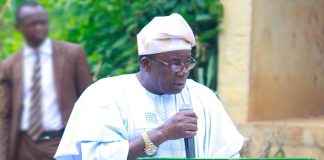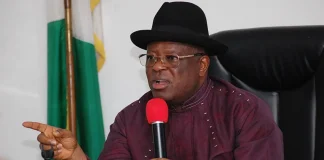🌿 Ruzu Non-Alcoholic Herbal Bitters
Ruzu Non-Alcoholic Herbal Bitters is a natural health supplement specially formulated to:
- ✅ Promote general wellness
- ✅ Detoxify the body
- ✅ Support the treatment of various ailments
Made from a powerful blend of 100% organic and medicinal herbs, Ruzu is completely alcohol-free, making it ideal for:
- 👪 All age groups
- 🌱 Health-conscious individuals
- 🌿 Anyone seeking non-alcoholic herbal remedies
Whether you're looking to boost your vitality, cleanse your system, or support healing the natural way, Ruzu Bitters offers a trusted herbal solution.
The Independent National Electoral Commission (INEC) has the constitutional power to choose election sites, including for prisoners housed in penal facilities around the nation, according to the Supreme Court of Nigeria.
The Supreme Court ruled in Victor Emenuwe & 4 ORS (for an inmate in Nigeria) v. Independent National Electoral Commission (INEC) & Anor (Appeal No: SC/1135/2019) that INEC, or the Nigerian Correctional Service (NCoS), has the authority to decide how and where inmates will cast their ballots, whether that means setting up polling places inside correctional facilities or moving inmates to the closest polling places.
The detainees themselves should not be burdened by logistical or security issues related to their move, the court stressed.
The Court of Appeal’s decision that left the site of inmate voting up to INEC and NCoS’s discretion was challenged by inmates through their attorney, President Aigbokhan, Freedom of Information (FOI), Counsel, in a lengthy legal struggle that culminated in this decision.
Due to the logistical impracticities and security threats associated with the relocation exercise, the prisoners had submitted an application for permission to appeal.
Regarding the Supreme Court’s decision, President Aigbokhan told reporters in Benin that on December 16, 2014, the Federal High Court ruled that INEC’s denial of voting rights to prisoners was unconstitutional and directed INEC and NCoS to implement the necessary procedures to allow prisoners to vote in all elections.
The verdict, he said, was only applicable to the prisoners named in the case.
Disappointed with the ruling, he claimed, the prisoners filed an appeal with the Court of Appeal, which on December 7, 2018, upheld the prisoners’ right to vote, granted them representative standing, and ordered INEC to make the necessary updates to its National Voters Register.
The Court of Appeal, however, refused to order INEC to set up registration centers within prisons, leaving inmates with the option of either setting up centers inside correctional facilities or moving them to outside polling places.
Read Also: Ronke Oshodi-Oke Speaks on Ex-Husband’s Absence at Daughter’s Wedding, Supports Tope Alabi
The appeal to the Supreme Court was prompted by this ambiguity and the possible disenfranchisement it provided.
President Aigbokhan, the detainees’ primary attorney, stated that the application was a legacy effort to smooth out some implementation curves.
“Electoral rights must be addressed with safe and workable plans in place. Our appeal centered on the lower courts’ disregard for the security and population consequences of moving prisoners to vote.
He went on to say: “On election days, there are usually restrictions on travel to allow INEC and security services to conduct elections efficiently. We trust that the convicts’ right to vote won’t be effectively undermined by the imposition of unrealistic methods.
In his ruling on Monday, May 5, 2025, Hon. Justice Adamu Jauro, JSC, rejected the request for permission to appeal, citing the constitutional confirmation of prisoners’ ability to vote.
The Supreme Court is no longer required to defend it against threats to implementation. According to the Court, any hindrance or departure from that right may now be dealt with through contempt procedures.
















